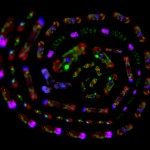Lien vers Pubmed [PMID] – 25743488
Trends Genet. 2015 Apr;31(4):177-86
Trinucleotide repeat expansions are involved in more than two dozen neurological and developmental disorders. Conventional therapeutic approaches aimed at regulating the expression level of affected genes, which rely on drugs, oligonucleotides, and/or transgenes, have met with only limited success so far. An alternative approach is to shorten repeats to non-pathological lengths using highly specific nucleases. Here, I review early experiments using meganucleases, zinc-finger nucleases (ZFN), and transcription-activator like effector nucleases (TALENs) to contract trinucleotide repeats, and discuss the possibility of using CRISPR-Cas nucleases to the same end. Although this is a nascent field, I explore the possibility of designing nucleases and effectively delivering them in the context of gene therapy.


